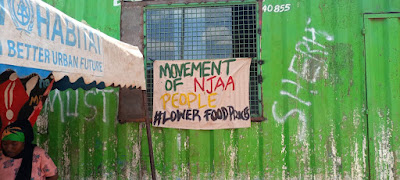A Cry in the Shadows on World Food Day
A government's primary responsibility is to serve its citizens and safeguard their well-being. In Kenya, however, there is a growing perception that the government is failing in its duty to protect the interests of its people. Our government, it seems, has shifted its priorities away from its citizens' well-being to appease international financial institutions like the World Bank and the IMF. The emphasis on fiscal responsibility and debt reduction often comes at the expense of the country's most vulnerable citizens.
One of the primary tools the government has employed to meet its fiscal targets is taxation. Taxes have been levied on virtually everything, from basic commodities to services. This taxation burden, combined with reduced subsidies on essential goods, has led to a significant spike in prices. This approach has led to a cascading effect on the cost of living, as taxes are imposed on nearly everything within the government's reach.
Another of the most contentious issues contributing to the high cost of living is the increase in fuel prices. The fuel levy, in particular, has had a cascading effect on the economy. It has led to skyrocketing transportation costs, which, in turn, have driven up the prices of goods and services. The government's decision to repeatedly raise fuel prices has resulted in unprecedented hardships for ordinary Kenyans, leaving us with no choice but to spend more of our income on transportation, energy, and other fuel-dependent needs.We, pushed to the brink by the relentless increase in the cost of living, took to the streets to protest these harsh economic conditions. Our protests, to some extent instigated by the Azimio Coalition, The Social Justice Centers Working Group and the civil society aimed to shed light on the challenges faced by ordinary citizens. Unfortunately, the government's response was one of brutal suppression, leading to the injury and death of many protesters. The state machinery was unleashed to quell dissent, silencing the voices of those seeking economic justice.
In the wake of the protests and public outcry, the government and opposition met for discussions. Shockingly, the cost of living was not part of their agenda. This omission left us feeling betrayed and mocked by our political leaders. We have watched as our struggles being dismissed and our needs ignored. It seemed that the interests of ordinary citizens had been overshadowed by political games and external pressures.
As the cost of living continues to rise, many of us have been pushed into a cycle of debt and poverty. In an attempt to make ends meet, some of us have resorted to borrowing, putting ourselves at risk of falling into unsustainable debt. The inability to afford basic necessities like food, housing, and healthcare has left countless families in a state of perpetual financial struggle.
The challenges we face as Kenyans on this World Food Day are poignant reminders that something must change. Access to affordable and nutritious food is a fundamental human right, and it should not be a privilege reserved for a select few. The government must prioritize the welfare of its citizens over external interests and economic institutions. The voices of the people, expressed through protests and advocacy, should not be ignored but embraced as a call for meaningful change.
Recommendations for a Better Future
Addressing Inflation: The government must take concrete steps to control inflation and stabilize the economy. This can only be achieved through prudent fiscal and monetary policies that protect the purchasing power of ordinary citizens.
Subsidies and Social Safety Nets: Introduce targeted subsidies for essential commodities like food and fuel. Implement effective social safety nets to support the most vulnerable members of society.
Transparency and Accountability: The government must be transparent in its dealings with international financial institutions and prioritize the welfare of its citizens. Accountability for how loans and aid are utilized is essential to ensure that they benefit the people.
Diversify the Economy: As a country, we must invest in diversifying our economy to reduce our overreliance on a few sectors. A more diversified economy provides employment opportunities and reduce vulnerabilities to external shocks.
Dialogue and Inclusivity: Engage in meaningful dialogue with all affected to address the concerns of the people. An inclusive approach to policy-making helps ensure that the voices of the marginalized are heard and acted upon.
Invest in Agriculture: Invest in agriculture to boost food production and reduce the country's reliance on expensive imports. Supporting small-scale farmers and improving agricultural practices can enhance food security.







Comments
Post a Comment